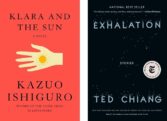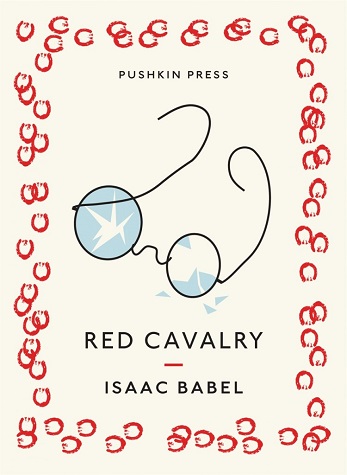
by by Margaret Kolb

Published by Pushkin Press, 2014 | 204 pages
In 1922, following the First World War and the Russian Civil War, Anna Akhmatova (1889-1966), the famous Russian modernist poet, wrote: “We are a people without tears. Straighter than you, more proud.” The quote, taken from her much anthologized poem “I am not one of those who left the land,” is as emblematic of Akhmatova’s forceful concision as it is of the famed toughness of the Russian people, hardened over the ages by unceasing loss and suffering. The poem takes the form of a castigation of Russian exiles who fled their country for more peaceful lands, leaving the fate of the nation to its “enemies.” Akhmatova could not, of course, have foreseen the unfathomable levels of violence and suffering that Stalinism and the Second World War were soon to inflict upon the Russian people. If she had, “I am not one of those who left the land” may have taken on a quite different register. Red Cavalry, Isaac Babel’s classic 1926 collection of short stories that recount his experiences in the Red Army’s 1st Cavalry during the Polish-Soviet War of 1920, provides an window into the world in which Akhmatova wrote, articulating the delicate balance of discordant forces that comprised the intellectual milieu of Revolutionary Russia in the years after the First World War and before Stalin razed the nascent dream of Lenin’s Soviet Union.
Isaac Babel was born in Odessa in 1894 to a family of successful merchants and warehouse owners. As a child he was homeschooled after being denied entry into the local preparatory school due to his Jewish heritage. He entered the Kiev Institute of Finance and Business, and moved to St. Petersburg after graduation in 1915. There Babel met Maxim Gorky and began writing. In 1920 he joined the 1st Calvary Army as a correspondent during the brief Polish-Soviet War for control of the land that comprises present day Ukraine. It was during this time and the subsequent years that he wrote the stories that would ultimately become Red Cavalry. Babel became an immensely celebrated writer during his life, even into the initial years of censorship and purge, until his execution during Stalin's Great Purge on 27 January 1940. Today he is recognized as one of the most prominent voices in the history of Russian Jewry.
The stories in Red Cavalry, translated here into the English by Boris Dralyuk, are primarily set on the battlefields, employing a cast of Soldiers, young idealists, and townspeople caught in the violence. While each story is distinctive, they come together to depict both the grim reality of war and the hope, resilience, and oftentimes crude humor of its perpetrators and victims. All stories are told by one of two narrators. The first is an unnamed Bolshevik Soldier who expresses the ‘righteous’ indignation of a revolutionary exalting in his ideology and reveling in the violence. The second is Lyutov, a journalist like Babel, who offers a more equivocal, though equally gritty, account of the violence of these years. Babel’s deft use of irony colors everything here.
The characters in Red Cavalry perpetually struggle to reconcile their ideological and patriotic commitment with the brutish violence that surrounds them. In the story “A Letter,” a young Soldier, Semyon, dictates a letter to the literate Lyutov for his mother. He describes how his father had “chopped down my brother” and then was eventually executed himself by Semyon’s own unit. At the conclusion of the letter, Lyutov asks Semyon, “was your father bad?” to which Semyon replies “My father was a dog.” The letter is impassioned, filled with warmth for his mother, hatred for his father, and consumed by the deprivations and hysteria of a Soldier desperately seeking self-assuagement. In contrast, Lyutov the narrator is detached and reflective. He fights the urge to “embellish” on the Soldier’s story and instead seeks to understand and offer only “the truth” as dictated.
Elsewhere in Red Cavalry, religion and memory intertwine to reveal the Revolution’s futile attempts to impose “scientific atheism” on the masses. In the story entitled “The Catholic Church in Novgorod,” we witness the Soldier celebrating the destruction and theft of church property. In “Gedali,” an old shop owner articulates his ideological battle: “The revolution – we say ‘yes’ to her, but will we say ‘no’ to the Sabbath?” Sabbath in this scene, and throughout the stories collected here, is more than synecdoche for religion; it is a metaphor for the collective semantic memory of a people caught in the crossfire. The narrator is touched by Gedali’s sentimentality and asks “Where can I get a Jewish shortcake, a Jewish glass of tea, with some of that retired God in the glass…?” to which Gedali responds “No place...nobody eats there nowadays, they just weep.” Bolshevism sought not only to construct a new society, but to construct a new citizen. Force and coercion may have suppressed some open displays of belief, but memory, ritual, and tradition persisted.
Babel at times employs a dark, ironic humor that cuts through the ideological platitudes and the murderous chaos of war to critique the jingoism, ostentation, and occasional barbarity of the Red Army. “The Life Story of Pavlichenko, Matvei Rodionych” satirizes the clichéd story of an oppressed peasant vindicated by the revolution. It begins with the love story of Pavlichenko, a herdsmen, and a peasant woman until “life doled [Pavlichenko] out some stripes for his shoulder straps.” As reward for Pavlichenko’s loyalty, a letter from Lenin given to him by Red Army officials gives him discretion to “deprive various people of life at his discretion.” Pavlichenko turns to his landowner, Nikitinsky, to exact his retribution. He doesn’t shoot him, however, because “shooting won’t get you to the soul.” He “stomps” him to death, because “I want to get to know life, what life’s all about.” As the story concludes, we are unclear whether his retribution was the reward or the price for his stripes, or perhaps both. In the story “Salt” - perhaps the most celebrated story of the collection – a woman attempts to smuggle a bag of salt covered in a blanket onto a train pretending it is her infant. After her deception is discovered, the Soldier throws her onto the tracks where, moments from death, she proclaims “I didn’t lie to you; it’s my grief that lied to you.” The Soldier shoots her in the back, and Babel narrates how he watches as her blood seeps into the landscape. The salt here alludes to Matthew 5:13 where Jesus gathers his followers – the poor, diseased, hungry, and destitute – and proclaims “Ye are the salt of the earth:” the woman, the “salt of the earth,” and her blood, the blood of all those mothers who suffer at the hands of the Revolution.
The ambivalence of Red Cavalry has sparked a century of debate about Isaac Babel’s position on the revolution. Unlike his famous contemporaries Akhmatova and Osip Mandelstam (1891-1938), he outwardly supported the Soviet system until his sentencing and subsequent execution for treason in 1939 (resulting from his affair with the wife of a prominent NKVD agent). Red Cavalry, however, is far too nuanced a text to permit such a univocal reading. Babel’s characters are stoic yet passionate, savage yet sophisticated, prone to blind, obstinate rage in one moment, and to sensitive reflection and acts of kindness in the next. Red Cavalryremains one of the most powerfully detailed and revealing depictions of a legendary people living through one of the most famously violent experiments of the modern age.
Adam Karr graduated from the United States Military Academy at West Point in 2005 with a B.S. in International History, and earned a Master of Arts in English from the University of Virginia in 2014. Adam also served a 14 month tour in Baghdad, Iraq and a 13 month tour in Nangahar Province, Afghanistan. He currently instructs English at West Point.















click to see who
MAKE Magazine Publisher MAKE Literary Productions Managing Editor Chamandeep Bains Assistant Managing Editor and Web Editor Kenneth Guay Fiction Editor Kamilah Foreman Nonfiction Editor Jessica Anne Poetry Editor Joel Craig Intercambio Poetry Editor Daniel Borzutzky Intercambio Prose Editor Brenda Lozano Latin American Art Portfolio Editor Alejandro Almanza Pereda Reviews Editor Mark Molloy Portfolio Art Editor Sarah Kramer Creative Director Joshua Hauth, Hauthwares Webmaster Johnathan Crawford Proofreader/Copy Editor Sarah Kramer Associate Fiction Editors LC Fiore, Jim Kourlas, Kerstin Schaars Contributing Editors Kyle Beachy, Steffi Drewes, Katie Geha, Kathleen Rooney Social Media Coordinator Jennifer De Poorter
MAKE Literary Productions, NFP Co-directors, Sarah Dodson and Joel Craig